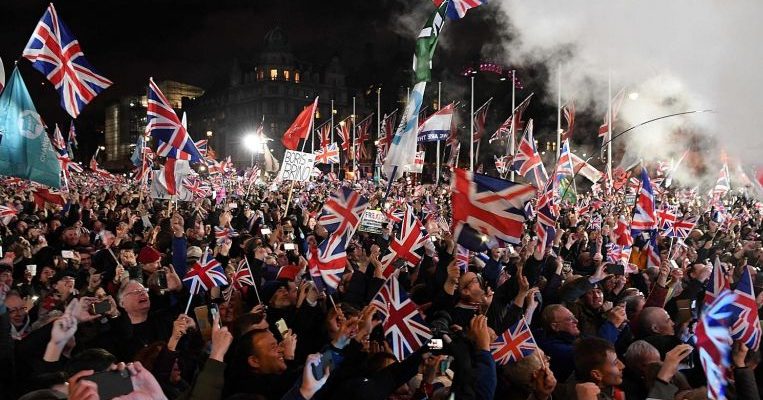
LONDON • Singing patriotic songs and waving Union Jacks, thousands of Britons flocked to a muddy patch of grass outside Parliament on a damp Friday night to toast their moment of history: Britain’s departure from the European Union.
Britain’s exit from the EU ends 47 years of union with Europe. It also draws a line under a bitter and divisive wrangle over whether, when and how the country should cut its ties to the bloc.
While Prime Minister Boris Johnson kept a low profile at a private reception in his Downing Street office, more than 5,000 people gathered just down the road to loudly celebrate the moment.
The crowd erupted into cheers as the clock hit 11pm, the moment of Britain’s exit. After a barrage of fireworks, smoke filled the area as onlookers hugged, popped champagne corks and filmed the moment on their phones.
“This is a fantastic day, a really really fantastic day. It’s been a long time coming,” said Mr Tony Williams, 53, from south-east London.
“We are free, from 11 o’clock, we have done it, and it is a great, great pleasure. We have done it.”
Brexit supporters young and old packed into Parliament Square to hear Brexit’s other talisman, campaigner Nigel Farage, and revel in a mix of nostalgia, patriotism and defiance.
“We did it. We transformed the landscape of our country,” Mr Farage told the crowd.
“We are celebrating tonight because we know that this is the single most important moment in the modern history of our great nation… The fact is that the war is over, we have won.”
A video montage providing a potted history of Britain’s relationship with Europe drew pantomime boos for proponents of the EU such as former Labour prime minister Tony Blair, while anti-EU figures like Mr Johnson, Mr Farage and Mrs Margaret Thatcher were loudly cheered.
Attendees sang Land Of Hope And Glory, with words projected on a big screen. There were impromptu bursts of the national anthem God Save The Queen, and a band performed Rule Britannia – a centuries-old song celebrating Britain’s one-time naval dominance.
Leaving was once a far-fetched idea: The United Kingdom joined the post-World War II project – that sought to build the ruined nations of Europe into a global power – in 1973 as “the sick man of Europe”. And less than two decades ago, British leaders were arguing about whether to join the euro.
But the turmoil of the euro zone crisis, fears about mass immigration and miscalculations by former prime minister David Cameron led to the 52 per cent to 48 per cent vote to leave in 2016.
For proponents, Brexit is “independence day” – an escape from what they cast as a German-dominated project with a doomed single currency that is failing its 500 million people.
They hope departure will herald reforms to reshape Britain and propel it ahead of its European rivals.
“We’ve had enough of the European Union, we don’t want it,”said Mr Adrian Langshaw, 42, who was celebrating the divorce.
“We want to be a sovereign nation and live as a British nation, make our decisions, make our rules and live how we want.”
REUTERS
